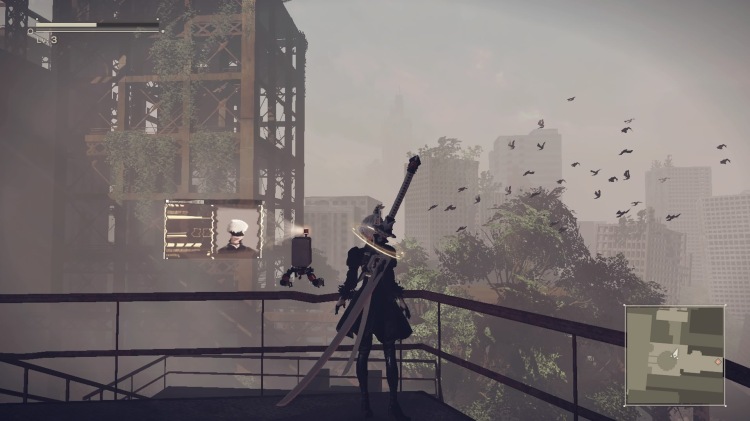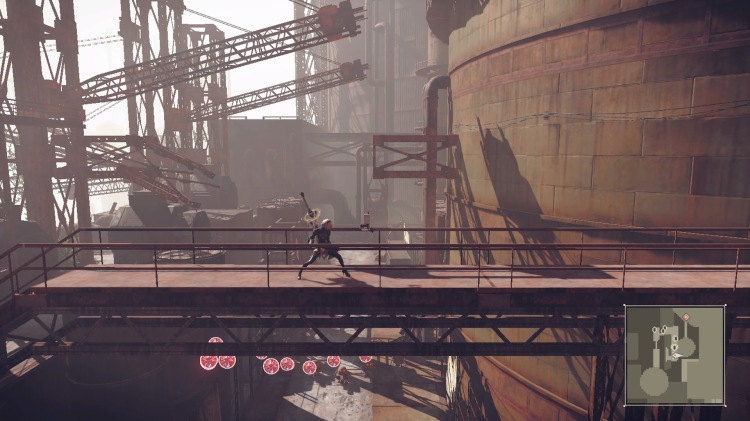“Why do you kill me?—What! Do not you live on the other side of the stream, my friend? If you lived on this side I should be an assassin, and it were unjust to kill you in this fashion, but since you live on the other side, I am a brave soldier, and it is just.”
– Blaise Pascal, Penseés
Ever since developers have gotten into their heads the idea that they must justify themselves to art critics, games have made numerous engagements with literature and philosophy. Some of these, like The Stanley Parable, basically a John Barth story in game form, or Kentucky Route Zero, a love letter to Marquez and magical realism, are quite good. The great majority are not.
Off the top of my head I can think of the laughably clumsy ways in which Mass Effect 3 and Deus Ex: Human Revolution try to pose Big Questions in the form of letting the player press one of several buttons at the very end to determine the fate of the world; and the Bioshock series starting out strong with a slam dunk on Randian libertarianism and then deciding that, for whatever reason, it needs to balance things out by “critiquing” “collectivism” and giving racism a fair shake. Much has been written about all of the above, and I see no need to repeat it, but games like those have taught us to expect very little from the medium aside from puffed-up attempts at erudition, like a sixteenth-century noble dropping Latin terms he doesn’t himself understand into every conversation.
Nier: Automata is nothing like that.
What I’m going to focus on here are two specific aspects of Automata that I find incredibly compelling, and absent from most other games I can think of: its ethical consistency and its thoughtfulness. (If you’re interested in a much more detailed and insightful critical dissection of Automata as a whole, check out this article by my friend Ashley. Huge spoilers within.)
Let’s think for a moment about how games tend to approach questions of ethics. The Mass Effect series is once again instructive, and illustrative of larger trends, in its model of moral decisions. These decisions are usually binary: kill the bad guy, or spare the bad guy so that he may repent? Pursue your ultimate goal ruthlessly, or with a modicum of consideration for others? Effectively, they are a long series of trolley problems. The player, a completely free moral agent, flips the switch one way or the other, and the story simply accomodates whatever you do, going out of its way to never make you feel too conflicted or doubtful about your choices. Even if your Commander Shepard turns out to be the biggest asshole in the observable universe, the excuse that “the mission comes first” is always there to soothe your conscience. In these games, and many others that follow their example, it seems to be an assumption made at the level of design that the player shouldn’t be allowed to feel bad about themselves – after all, wouldn’t that detract from the interactive experience they paid for?
I have only one word for the design principle that appears to be guiding how these morality systems are built, and that word is cowardice.
Here’s what I believe: a story doesn’t come from nowhere, and it’s not addressed to abstract moral agents. Both writers and readers, both designers and players, are actual living people in the material world, entangled in all the systems of meaning and power that we collectively call society. To pretend that either the author or the player can just step out of society into some realm of “free” moral choices is simply absurd. A lot of us always play Paragon Shepard because we like to think of ourselves as nice people; a lot of us always play Renegade because we find something compelling in the fantasy of the jerk anti-hero who still saves everyone in the end. Choice is the completely wrong framework to think about it: at best, we choose between two pre-written characters in a story that otherwise doesn’t change very much. But the insistence that choice is somehow an essential part of the experience, rather than a mostly cosmetic addition, ends up weakening games like these, thematically and narratively.
Nier: Automata does not set out to give you choices. It sets out to tell a story, in which some choices may come up, but which already has a well-defined world full of lively characters, who make their own decisions based on who they are, regardless of whether or not the player is controlling them at the time. And in deliberately taking your illusory freedom away from you, the game is free to tell a better, more coherent story. In particular, it manages to achieve a much greater thematic and ethical consistency.

And is love then more
Than the kick galvanic
Or the thundering roar
Of Ash volcanic
Belched from some crater
Of earth-fire within?
Are we automata
Or Angel-kin?
– A. S. Byatt, Possession
In a basic outline, Automata’s setting is this: it’s the far, far, very far future. There are no humans left on Earth. The planet is consumed by a neverending war between machines and androids, who keep killing each other in increasingly inventive ways long after all the people who gave them the orders to fight have disappeared from both the world and living memory. Naturally, both sides of the conflict hate each other and are convinced of their own superiority – and of their special relationship with humanity.
The story has a set of very definite ethical propositions underlying it, and wastes absolutely no time in presenting them. The first is that these mortal enemies are indistinguishable from one another. The second is that they are indistinguishable from humans: they do every conceivable human thing, from procreation to sports to art to philosophy to war. (A sidenote is that they are shown to be indistinguishable from animals as well, and the possibility of undermining the human/animal binary is at least suggested.)
The first Nier game features a very similar conflict as the machine-android war; in that game, humans have freed their conscious selves from their bodies to escape an incurable worldwide pandemic. At the same time, the replacement bodies they’ve bred for themselves to hop back into after the plague has passed have developed personalities, built societies, formed relationships – they have become human. In a game beholden to the Mass Effect model of moral choice, the ending would inevitably have the player picking the side they think is “right”, or more deserving of life. Possibly there would also be a third, hidden solution, locked behind arbitrary gameplay requirements, that makes absolutely everyone happy and restores harmony to the world.
Nier utterly refuses to let you do that, and that’s why I love it. You don’t get to flip the switch. Both sides are equally “deserving”, as much as that concept has any meaning; at any rate, they are both human and alive, and the victory of one side means annihilation for the other – or, just as likely, the mutual ruin of the contending classes.
Put simply, rather than posing an ethical question to the player like an abstract puzzle or interesting chess problem, both Nier games take an ethical position from the very start, and then make the strongest argument for it that they possibly can through their themes, plots and mechanics, much like Undertale (which I’d always assumed must have been inspired by the first Nier). The characters you control just happened to land on one side of the conflict, and there is nothing for them to do but see it through to the very end.

That is not to say that the outcome is necessarily hopeless. The world of Automata is bleak, and even newcomers to it will start getting the sense about halfway in that a happy ending for everyone isn’t on the cards. Still, the narrative does not close off all alternatives to the war. Even early on we see people on both sides of the divide refusing to fight, disobeying orders, slacking off in their duties, committing to pacifism or just running off somewhere. The game isn’t coy about sympathizing with the deserters and conscientous objectors – it does not condescend to you enough to ask “IS WAR BAD Y/N”. It assumes that you won’t even pause for a second to answer that, and the fact that you sometimes are carrying out orders to capture or eliminate the deserters does not introduce any “moral gray area” or “nuance” to this banal question. It just means your characters are doing the wrong thing.
I won’t spoil the final conclusion to all this, except to say that it’s both incredibly satisfying and completely heartbreaking, and that it achieves that effect through means of expression that are unique to videogames, rather than trying to imitate more established forms like the film or the novel. Nier: Automata is one of those few games that not only fully explores the possibilities of the medium, but has something to tell you on top of that, something about these odd creatures called “humans” and what it might mean to be one.
You must be logged in to post a comment.